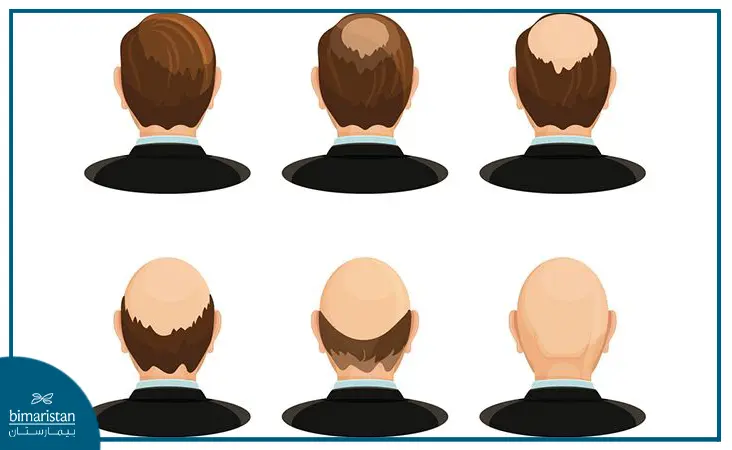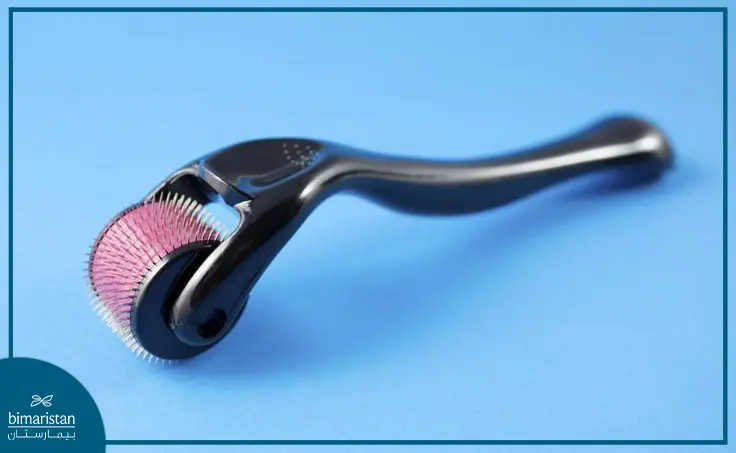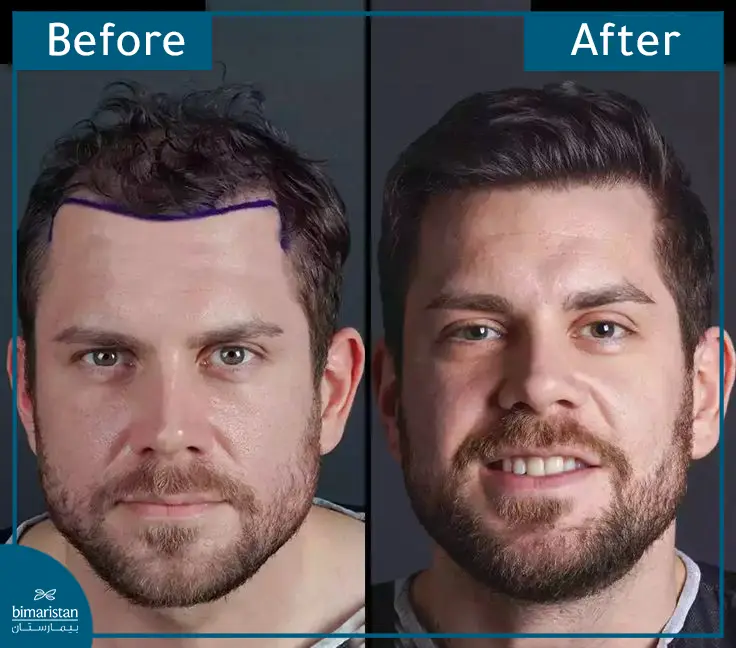Hereditary baldness is the most common cause of hair loss in both males and females worldwide. The prevalence of this condition increases with age, affecting more than 50% of males and 25% of females by the age of 50. In less common cases, signs of hereditary baldness can begin during adolescence. The condition is more common and severe in Caucasians, Asians, and Africans. Additionally, a son with a father suffering from hereditary baldness has a five to six times increased relative risk of developing this condition.
What is hereditary baldness?
Hereditary baldness, also known as androgenetic alopecia, is a genetically determined disorder characterized by the gradual thinning of hair. Hair loss progressively increases with age, leading to the transformation of terminal hair into vellus hair and then to indeterminate hair, following specific patterns.
When does hereditary baldness begin in men?
While most men experience a gradual decrease in hair density as they age, hereditary baldness can begin at an early age, particularly in the early twenties. However, significant hair loss usually becomes noticeable at an advanced age (around 50 years).
Medical tests to find out the causes of hair loss
Tests That May Help Diagnose the Cause of Hair Loss:
- Hormone Tests: Several hormones can be screened in cases of severe hair loss, including testosterone, dihydrotestosterone (DHEA), prolactin, luteinizing hormone (LH), and follicle-stimulating hormone (FSH).
- Thyroid Hormone Level Tests: These are among the most important tests to perform and include hormones T4, T3, and TSH.
- Complete Blood Count (CBC) Test: This test helps determine the count of red blood cells and hemoglobin levels, among other things, which can cause hair loss.
- Iron and Ferritin Tests: Low levels of these can cause hair loss.
- Hair Pull Test: This is a physical test performed by a doctor. It reveals the severity of hair loss by checking how many hairs fall out when a small amount of hair is pulled.
- Scalp Biopsy: After a biopsy, a small part of the scalp is examined under a microscope, helping to identify the cause of hair loss.
Hereditary Baldness in Men
Men are more likely to experience hereditary baldness at some point in their lives compared to women. Hair loss usually begins at the top sides of the head and continues around the perimeter and crown, often leaving a ring of hair at the lower part of the head. In many cases, men with hereditary baldness may lose their hair completely, resulting in baldness.
Hereditary Baldness in Women
In women with hereditary baldness, hair loss occurs slowly across the entire scalp, but the hairline usually does not recede. Although hair loss can begin at any time after puberty, many women experience this type of hair loss as they age. Hair loss in women can gradually increase, leading to significant hair thinning and density reduction, but it rarely leads to complete baldness.
Stages of Hereditary Baldness
The stages of hereditary baldness vary slightly between genders and are divided as follows:
Stages of Hereditary Baldness in Men
Men experience various stages of hereditary baldness, which include:
- Stage 1: Very light hair loss around the temporal areas (above the ears), with no hair loss at the top of the head.
- Stage 2: Light hair loss around the temporal areas (above the ears), with no hair loss at the top of the head.
- Stage 3: Noticeable recession of the hairline, with visible hair loss at the top of the head.
- Stage 4: Hair loss at the top of the head and temporal areas (above the ears), but good hair density remains in the middle of the scalp.
- Stage 5: Widespread hair loss in the top of the head and temporal areas (above the ears).
- Stage 6: General hair loss on the scalp, but some hair remains at the edge of the top of the head.
- Stage 7: Hair loss in all temporal areas (above the ears), the top of the head, and the middle of the scalp.

Stages of Hereditary Baldness in Women
Women experience different stages of hair loss, starting from mild stages (1-2) and potentially progressing to more severe stages (3-4). These stages are characterized by the following:
- Stages 1-2: Noticeable thinning of hair on the top of the scalp with advancing hair loss.
- Stage 3: Severe patterned hair loss concentrated on the top of the scalp, including the crown area.
- Stage 4: Rarely seen in clinical practice, this stage involves significant patterned hair loss in women, with very little hair remaining or even complete hair loss on the top of the scalp or crown area.
Another stage, called the frontal stage, involves hair loss in women’s frontal area, gradually receding backward. This stage of hair loss is very rare among women with hereditary baldness.
Causes of Hereditary Baldness
Genetic factors are the most common and significant cause of baldness, more prevalent in men than women. Several genetic factors are involved:
For men, hereditary baldness begins as an M-shaped recession at the front of the scalp, often starting in the twenties or thirties. Approximately 80% of men experience hereditary baldness by the age of 80. Studies estimate that genetics account for about 80% of the causes of male pattern baldness.
Causes of Hereditary Baldness in Men
The genetic component of male pattern baldness is not well understood but is believed to be polygenic, meaning it involves more than one gene.
Humans have 23 pairs of chromosomes containing genetic information. Men inherit an X chromosome from their mother and a Y chromosome from their father.
Baldness is closely associated with the AR gene located on the X chromosome. A large statistical study of 12,806 men of European descent found that the risk of hereditary baldness in individuals with this gene is double compared to those without it.
The AR gene is not the only gene that determines male pattern baldness. A 2017 statistical review found that 63 other genes may play a role in male pattern baldness, with only six located on the X chromosome.
Causes of Hereditary Baldness in Women
Women often experience hair loss after menopause according to the Ludwig pattern, which involves gradual baldness along the central part of the scalp.
The genetic component of hereditary baldness in women is not fully understood. However, like the male pattern, it also involves multiple different genes. Some genes encode an enzyme called aromatase, which converts testosterone to estradiol. These genes may play a significant role in female baldness and explain why many women lose their hair after menopause.
Treatments for Hereditary Baldness in Turkey
Treatments targeting hereditary baldness can reduce hair loss and potentially regrow hair. Optimal results are achieved when treatment begins early, at the first signs of hair loss.
Stem Cell Therapy for Hereditary Baldness
Recently, stem cell-based treatments have gained significant attention as potential new therapies. Stem cells focus on reactivating hair follicles, thus improving the growth, renewal, and development of hair follicles. Stem cells are typically collected from the patient’s body, particularly from adipose tissue. After collection and processing, these stem cells are injected into the affected scalp area. By activating these stem cells, new follicles can be produced, helping to restore healthy hair growth in the affected areas.
The advantage of using stem cell therapy over other options is that it does not require any risky surgery or continuous medical care. There are two types of stem cell transplants:
- Autologous: Stem cells come from the same person who will receive the transplant, meaning the patient is the donor for themselves.
- Allogeneic: Stem cells come from a different person other than the patient, either from a related or unrelated matching donor.
Treatment of Hereditary Baldness in Men
Hereditary baldness is a common condition affecting a large number of men worldwide. Its impact goes beyond aesthetics, affecting self-esteem and psychological well-being, underscoring the importance of developing effective treatments. Treatments range from topical minoxidil and oral finasteride to advanced therapies such as stem cell therapy, low-level laser therapy, and platelet-rich plasma (PRP) injections, among others, to control hair loss and improve the individual’s quality of life.
Garlic for Hereditary Baldness
Using garlic topically or as part of the diet may benefit hair growth. Garlic contains substances that may help hair growth, including:
- Vitamins and Minerals: Vitamins B-6 and C, manganese, and selenium.
- Natural Antimicrobial and Antifungal Properties: These properties help kill bacteria and fight germs, keeping the scalp healthy.
Despite these potential benefits and its widespread use in traditional medicine for hair loss treatment, there is no definitive scientific evidence regarding garlic’s positive effect on hair growth.
Derma Roller for Hereditary Baldness
Studies have shown that microneedling with a derma roller can help treat hereditary baldness, unlike other types of hair loss such as hair loss due to iron deficiency. Therefore, it is important to consult a specialist to determine the best treatment approach.
Derma rollers affect hair growth by:
- Activating Hair Follicles: Wound healing mechanisms caused by derma rolling activate stem cells in the hair.
- Increasing Platelet-Derived Growth Factor: Platelets are essential for wound healing and blood vessel growth, promoting cell proliferation in hair follicles.
- Improving Absorption of Hair Growth Products: Micropores and micro-injuries caused by derma rolling facilitate the absorption of topical solutions like minoxidil and finasteride into the scalp.
A study found that using a derma roller could significantly enhance the effect of minoxidil on new hair growth. 82% of participants using microneedling with minoxidil reported over 50% hair improvement, compared to just 4.5% of those using minoxidil alone. The change in average hair count was also four times higher in those using a derma roller with minoxidil.

Hair Transplantation
Hair transplantation is considered the best solution for treating hereditary baldness and all cases of hair loss. In some instances, it has provided much better results than the recipients had anticipated. Hair transplantation is completely different from traditional and medicinal treatments, and the success rate of hair transplantation for hereditary baldness on a healthy scalp can reach up to 95% in males.
FUT Technique (Follicular Unit Transplantation): The surgeon uses a scalpel to cut a strip of scalp several inches long from the back of the head, then closes this incision with surgical stitches. The surgeon then separates the removed portion of the scalp into small sections using a magnifying lens and a surgical scalpel. When transplanted, these sections help achieve natural-looking hair growth.
FUE Technique (Follicular Unit Extraction): Hair follicles are directly extracted from the back of the head through hundreds to thousands of tiny incisions. The surgeon then makes small holes with a blade or needle in the scalp area and gently places the hair in these holes. The scalp is covered with gauze or bandages for a few days.

Hair transplantation in Turkey is considered a destination for medical tourism that distinguishes Turkey from all other countries in the world.
Minoxidil Spray for Treating Hereditary Baldness
Although the exact mechanism is not well understood, minoxidil prolongs the anagen phase and increases blood flow to the hair follicle. Hair growth is more noticeable at the crown than in the frontal areas and is usually observed only after at least four months of consistent use. Continued topical application is essential, as discontinuation leads to a rapid return to the pre-treatment pattern of hair loss.
Patients who respond best to this medication are those with recent onset of hereditary baldness and small areas of hair loss. The medication is available as a 2% or 5% solution, with the 5% solution being somewhat more effective. A 48-week study indicated a 45% increase in hair growth with the 5% solution compared to the 2% solution. Generally, women respond better to topical minoxidil than men.
Oils for Treating Hereditary Baldness
Oils are not a guaranteed treatment to delay hereditary baldness, but some oils and mixtures may help improve the overall health of the scalp and hair, potentially promoting healthy hair growth and reducing hair loss. It should be noted that the effects of these oils vary from person to person, and there is no guarantee of their effectiveness in preventing hair loss or delaying baldness. These oils include:
- Rosemary oil
- Jojoba oil
- Castor oil
- Olive oil
- Peppermint oil
- Sweet almond oil
Rosemary Oil for Treating Hereditary Baldness
Rosemary oil may help reduce hair loss in some cases, particularly in the early stages. Its effectiveness in promoting hair growth in the advanced stages of hereditary baldness is less significant and its positive effects are barely noticeable.
Rosemary oil contains carnosic acid, which has anti-inflammatory and antioxidant properties that work to regenerate damaged scalp tissues. Researchers have found that rosemary oil may be effective in combating hair loss, with a potency similar to minoxidil spray, although the degree of effectiveness varies among individuals.
Herbal Treatments for Hereditary Baldness
Herbs have been used in various hair and skincare routines for a long time. Some evidence suggests that certain herbs can help with hair growth and improve scalp health in general. These herbs include:
- Horsetail (Equisetum arvense): Contains high levels of silica, which penetrates hair follicles and helps reduce hair loss while increasing hair thickness.
- Red Clover (Trifolium pratense): Some studies have shown that red clover inhibits the enzyme 5-alpha reductase, which converts testosterone to dihydrotestosterone, a hormone implicated in hereditary baldness, and helps reduce inflammation, thereby promoting hair growth.
- Stinging Nettle (Urtica dioica): Believed to aid hair growth and reduce hair loss due to its high content of vitamins and minerals, such as iron.
However, caution is advised when using such herbs as they are not safe for everyone. Some herbs can interact with medications and other health conditions, and certain herbs should not be used during pregnancy and lactation. Additionally, taking some dietary supplements can exacerbate hair loss. Therefore, it is essential to consult a specialist before use.
Resources:
- Harvard Health Publishing
- Medscape
